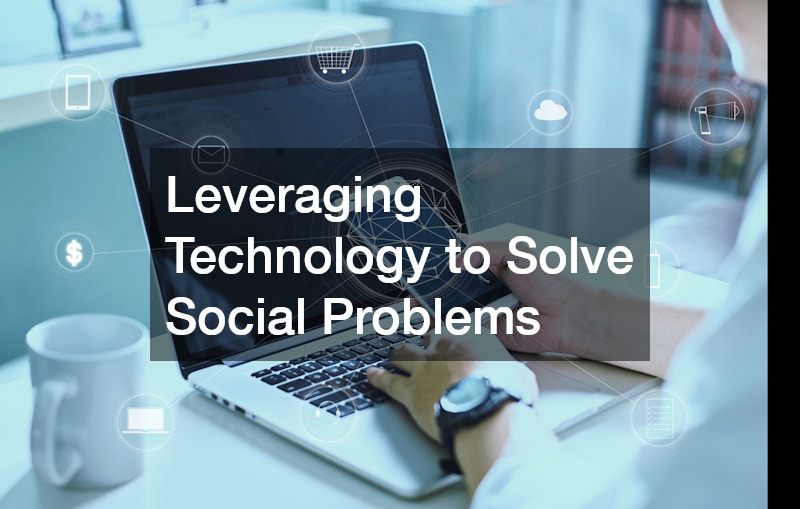In a world increasingly driven by purpose and innovation, social entrepreneurship has emerged as a powerful force for positive change. Unlike traditional businesses that focus solely on profit, social enterprises blend mission with margin, creating models that tackle pressing social, environmental, and community challenges while remaining financially viable. As new challenges arise, so do the opportunities for creative problem-solving. Entrepreneurs are now expected to do more than just build a successful business; they’re challenged to address real-world issues through sustainable, impactful solutions.
For aspiring founders and mission-driven startups, exploring social entrepreneurship can open doors to meaningful ventures that leave a lasting impact. These ideas are not only about doing good—they’re about doing business differently, through innovation, empathy, and community-centered design. Whether it’s in the realms of education, sustainability, or healthcare, the potential to drive social value through entrepreneurship has never been greater. The following sections highlight innovative paths that combine profitability with purpose, offering insight into how startups can embed social good at the core of their business models.
Leveraging Technology to Solve Social Problems

In today’s digital age, technology plays a pivotal role in addressing societal challenges at scale. Social entrepreneurs are increasingly turning to tech-driven tools, like mobile platforms, smart devices, and cloud services, to create more inclusive and accessible solutions. When used ethically and thoughtfully, technology can dismantle barriers, increase efficiency, and broaden a startup’s ability to reach underserved populations. From improving education to transforming agriculture, tech-driven social entrepreneurship ideas empower businesses to take big leaps forward in social innovation.
One strong example of this approach is using solar panel installation to deliver clean energy to off-grid or under-resourced communities. With the declining costs of solar technology and increasing concerns about climate change, social startups have a real opportunity to make renewable energy both scalable and affordable. By developing tech-enabled platforms for remote energy monitoring or solar financing, entrepreneurs can introduce a sustainable business model that not only generates revenue but also dramatically improves the quality of life for underserved populations.
Empowering Communities Through Local Sourcing
Community empowerment lies at the heart of many successful social entrepreneurship ideas. One of the most direct ways to support local development is by sourcing labor, materials, and services from within the communities a business aims to serve. This approach fosters economic resilience, builds local ownership, and strengthens social ties, while ensuring that a business’s benefits are felt close to home. Startups that commit to local sourcing often find that their impact becomes deeper, more authentic, and more sustainable over time.
A powerful illustration of this is seen in ventures that offer supportive housing services while employing local residents in construction, maintenance, or care roles. By training and hiring from the communities in need of these services, entrepreneurs create a cycle of empowerment, where individuals are not only provided with stable housing but also with meaningful employment. This model of social entrepreneurship doesn’t just build homes; it builds community, capacity, and long-term pathways to independence.
Reducing Waste With Circular Economy Models
The linear “take-make-dispose” approach to production is quickly becoming obsolete as businesses around the world embrace circular economy principles. At the core of this model is the idea of designing out waste and keeping materials in use for as long as possible. This shift opens the door for creative social entrepreneurship ideas that address environmental degradation while introducing innovative ways to generate revenue. By reimagining how products are made, used, and repurposed, startups can build sustainability into their very foundation.
An impactful example is an aluminum recycling service that turns post-consumer scrap into new products while engaging local communities in the process. Aluminum is one of the most recyclable materials on earth, and its reuse saves significant energy and reduces carbon emissions. A startup that collects and processes discarded aluminum—perhaps in partnership with municipalities or community groups—can create a viable business while championing environmental responsibility. This model also creates job opportunities and educates the public on sustainability, embodying the dual goals of profit and purpose.
Promoting Education Through Digital Platforms

Education is a powerful equalizer, yet access to it remains uneven across socioeconomic and geographic lines. Digital learning platforms present one of the most scalable and flexible social entrepreneurship ideas for bridging this divide. These platforms can offer tailored content, real-time feedback, and adaptive learning experiences that traditional classrooms often cannot. Social startups in this space are uniquely positioned to democratize knowledge, empower individuals, and foster safer, more informed communities.
One specific use of this model involves offering local self defense classes online or through hybrid programs that combine digital resources with in-person training. Such initiatives not only educate people on physical safety but also build confidence and community awareness, especially in underserved areas where safety resources may be limited. Entrepreneurs can use mobile apps or streaming platforms to deliver content affordably and accessibly, creating a sustainable revenue stream while addressing a very real social need.
Enhancing Health Access With Mobile Solutions
Access to healthcare remains a global challenge, especially for marginalized and rural populations. Mobile health solutions are gaining traction as scalable, cost-effective ways to deliver critical care, mental health support, and information to those who need it most. From mobile clinics to telehealth platforms, startups have a wide range of social entrepreneurship ideas they can explore to fill healthcare gaps. These ventures not only improve health outcomes but also reduce the burden on overstrained systems.
One meaningful application is in providing alcohol rehab support via mobile apps and teletherapy platforms. These tools can connect individuals struggling with addiction to counselors, peer groups, and recovery resources—no matter where they are located. This approach reduces stigma, lowers barriers to entry, and increases accessibility for those who might otherwise go without help. It also creates space for innovative pricing models like subscriptions or sliding-scale fees, ensuring that the solution remains financially sustainable while delivering critical social value.
Supporting Marginalized Groups Through Employment
One of the most impactful ways social entrepreneurs can drive change is by creating inclusive employment opportunities. Many social entrepreneurship ideas are rooted in the belief that everyone deserves a fair shot at meaningful work, regardless of their background or circumstances. By hiring individuals from marginalized communities, such as those experiencing homelessness, previously incarcerated individuals, or refugees, businesses can help break cycles of poverty and exclusion while building strong, values-based teams.
For instance, a startup could develop an apartment painting service that trains and employs individuals who face significant barriers to employment. Painting requires relatively low startup costs and can serve as a gateway to broader construction or renovation skills. This model creates dignity through work, adds value for landlords or housing organizations, and introduces an accessible pathway for economic mobility. By reinvesting profits into job training and wraparound support services, the business becomes a force for both economic and social progress.
Creating Impact With Subscription-Based Models
Subscription-based models offer predictability in revenue and consistent engagement with customers, making them ideal for many social ventures. When paired with mission-driven services, these models can create lasting change while sustaining the operations behind them. Some of the most successful social entrepreneurship ideas leverage subscriptions to provide ongoing access to essential goods or services in areas like health, education, or sanitation.
An example of this is a water-focused startup offering affordable water sanitizing kits or services through monthly subscriptions. In areas where clean water is scarce or unreliable, this model can ensure continuous access to safe drinking water without the need for constant outside intervention. By bundling products with educational materials and community outreach, the business can deepen its social impact while generating steady income to grow and serve more households over time.
Using Crowdfunding for Social Good

Crowdfunding has dramatically reshaped the landscape of startup financing by offering entrepreneurs a way to raise capital directly from the public, bypassing traditional gatekeepers like banks or venture capitalists. For social enterprises, this method holds even greater potential. It allows founders to tell their stories, share their missions, and connect with individuals who believe in the impact they’re trying to make. When a crowdfunding campaign is built around a compelling social purpose, it does more than generate funds; it mobilizes a community.
In addition to its financial benefits, crowdfunding serves as a strategic tool for early-stage validation and visibility. Social entrepreneurs can test their social entrepreneurship ideas in the real world, receiving immediate feedback from contributors and gauging interest before investing heavily in product development or infrastructure. A successful campaign not only signals market demand but also creates public accountability and transparency—qualities that build trust and attract future investors or partners. The blend of storytelling, community engagement, and low-barrier fundraising makes crowdfunding one of the most accessible and powerful tools for mission-driven ventures.
A great use of this model would be launching a medical waste disposal initiative through crowdfunding. In many underserved regions, improper disposal of medical waste poses serious health and environmental risks. A socially driven startup could propose a low-cost, locally managed disposal solution and raise initial funds through a campaign that highlights the public health benefits. This would not only allow the enterprise to begin operations without a heavy upfront investment but also foster early community ownership of the solution.
Building Sustainable Products for Long-Term Change
Sustainability is no longer a trend—it’s a necessity. From packaging to architecture, designing with the planet in mind has become a foundational element of modern entrepreneurship. Among the most forward-thinking social entrepreneurship ideas are those that blend ecological awareness with practical, scalable solutions that stand the test of time.
One standout approach is focusing on sustainable building design to create eco-friendly housing or commercial spaces. Whether it’s through passive heating, natural materials, or energy-efficient systems, startups can reduce the environmental footprint of construction while improving living standards. By partnering with green architects and local builders, social enterprises can make sustainable living accessible and affordable, especially in communities vulnerable to climate-related risks. This business model builds both physical and social infrastructure that supports long-term resilience.
Encouraging Financial Inclusion via Microservices
Access to financial and legal services is often limited for vulnerable populations, creating systemic barriers to upward mobility. Social entrepreneurs are uniquely positioned to bridge these gaps through microservices—small-scale, community-centered offerings that deliver essential support in affordable and scalable ways. These types of social entrepreneurship ideas can level the playing field by making professional expertise accessible to those who have traditionally been left out of the system.
One compelling example is a platform that connects individuals in need with a criminal defense attorney on a microservice basis. Many people facing legal issues can’t afford traditional representation or even basic legal advice. A startup could use technology to streamline consultations, offer flat-fee services, or provide access to legal resources in underserved communities. This not only addresses justice inequities but also builds trust in the legal system while offering a profitable business model grounded in social impact.
Expanding Your Social Enterprise Across Borders

Expanding a social enterprise from local roots to a global scale requires strategic planning and a deep understanding of diverse markets. One of the key social entrepreneurship ideas for successful international expansion is the ability to adapt your business model to different cultural and economic environments. What works in your home country may need significant adjustments when entering foreign markets. This could involve refining your products, modifying your messaging, or collaborating with local partners who understand the nuances of the region. By establishing a strong local presence first, social entrepreneurs can lay the groundwork for a global launch that resonates with international audiences.
As your social enterprise grows, it’s also important to consider global challenges such as safety and security. For instance, private security services can be crucial when operating in areas with unstable conditions or in markets that require high levels of protection. Ensuring the safety of both your team and your assets can provide the peace of mind necessary to focus on the mission of your social enterprise. As you scale across borders, addressing these logistical and security concerns will help foster trust and confidence in your global operations, making it easier to sustain your positive impact worldwide.
Social entrepreneurship is more than a buzzword—it’s a movement redefining what it means to build a business in the 21st century. At its heart, it represents a fusion of purpose and profit, where innovation serves people, and success is measured not just in revenue, but in the real-world impact made. From clean energy and education to legal access and sustainability, the spectrum of social entrepreneurship is as wide as the challenges they aim to solve.
By choosing models that uplift communities, protect the planet, and empower individuals, entrepreneurs can play a transformative role in shaping a better future. Whether you’re launching a new venture or looking to infuse your existing business with deeper meaning, these ideas offer both inspiration and a blueprint. The key is to stay grounded in empathy, driven by innovation, and committed to making every transaction an opportunity for change. Social entrepreneurship isn’t just a strategy—it’s a responsibility and a chance to leave a lasting legacy.
